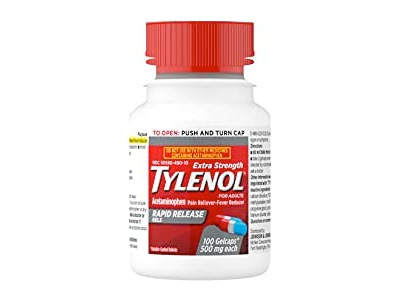Q: I take Tylenol® for fever or headaches because it doesn’t upset my stomach like ibuprofen does, but my sister-in-law insists that Tylenol® is dangerous.
There is new evidence that Tylenol® is usually very safe to use but CAN cause severe liver damage if you are not careful.
Tylenol® was first used as a pain reliever in 1893. Due to concerns about liver damage, it was used cautiously until 1949, when it became a widely accepted alternative to aspirin. Today, acetaminophen is the most popular non-prescription painkiller sold in the United States. It is considered a safer choice than ibuprofen or naproxen.
Tylenol® (acetaminophen) is safe for most people, but certain situations can make it very dangerous. When your body eliminates acetaminophen, a small amount changes into a compound that attaches to a liver cell, killing it. To prevent that from happening, your liver makes a molecule called glutathione which changes the toxic compound from acetaminophen into something perfectly safe.
It’s not safe to take Tylenol® if you don’t have enough glutathione to protect your liver from its toxic byproduct. Fasting changes how your liver eliminates acetaminophen by creating more of its poisonous byproduct, requiring additional glutathione. Taking acetaminophen or drinking alcohol uses precious glutathione, and people with liver disease have lower glutathione levels.
The more acetaminophen you take, the more glutathione you’ll need to stay safe.
The Food and Drug Administration (FDA) recommends taking no more than 4000mg per day of acetaminophen for healthy adults. That’s equivalent to twelve regular strength acetaminophen pills of 325mg each, eight extra-strength tablets of 500mg each, or six extended-release tablets of 650mg.
If you are over 60 years old or have liver problems, the FDA recommends a lower daily limit of 3100mg acetaminophen. This limit equals nine 325mg tablets, six 500mg pills, or four extended-release 650mg pills.
Suppose you have severe liver problems or frequently drink more than 2 ounces of alcohol (one 12-ounce beer, one glass of wine, or a shot glass of distilled spirits) daily. In that case, new evidence suggests that acetaminophen may NOT be safe for you to take. That’s because you have less glutathione available to detoxify acetaminophen.
Most people who develop liver failure from taking acetaminophen never realize they are in danger until it is too late and the damage is done. Part of the problem is the popularity of acetaminophen with drug manufacturers. Over 200 over-the-counter products contain acetaminophen. It’s also found in widely prescribed prescription analgesics like Vicodin® and Norco®.
Unfortunately, over-the-counter remedies are not the only places in your medicine cabinet you can find acetaminophen. Common prescription pain medicines like Vicodin® or Percocet® contain both a potent narcotic pain reliever and acetaminophen. Unfortunately, acetaminophen in a prescription is easy to overlook. Instead of squeezing the word acetaminophen onto prescription labels, the abbreviation APAP or ACET is used instead.
Here are 6 ways to keep your liver safe when taking Tylenol® (acetaminophen):
- Know your maximum “safe” dose.
For healthy adults, taking 4000mg over 24 hours is the maximum recommended dose of Tylenol®. Healthy older adults should not take over 3100mg per day. If you have liver disease, ask your doctor if it is safe for you to take ANY acetaminophen.
- Keep track of how much Tylenol® you take.
To keep within your safe dosing limit, check for the names acetaminophen and paracetamol in the active ingredients of all non-prescription products, food supplements, and herbal remedies. Paracetamol is another name for acetaminophen used in some other countries.
- Take just one at a time.
Taking two or more medicines that contain acetaminophen puts you at high risk of getting too much. Try to avoid using pain medicine prescriptions from more than one medical provider such as a dentist, surgeon, ER doctor, or urgent care center. Look for the abbreviation APAP or ACET on the label of your prescription bottles, or ask your pharmacist if any of your prescriptions contain acetaminophen.
- Avoid heavy alcohol use.
Heavy drinking uses up precious glutathione. If you also have liver disease, you may need to avoid taking Tylenol® altogether. Ask your doctor about whether acetaminophen is safe for you to take for fever or pain and how much.
- Avoid taking Tylenol® when fasting.
Fasting increases the amount of dangerous byproduct your body generates when taking Tylenol®. More toxic byproduct requires more glutathione to detoxify.
- Avoid taking acetaminophen for hangovers.
Combining fasting with heavy alcohol intake will seriously deplete your glutathione. Ibuprofen or naproxen is safer to use for hangover symptoms.


